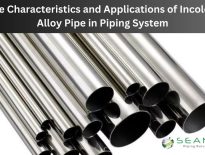When choosing between different types of steel sheets, it can be tough to know what to look for. The most popular options are carbon steel sheet and carbon steel sheet. Both offer unique advantages and disadvantages, so it’s important to understand the differences to choose the best option for your project. In this blog post, we’ll examine both types of steel sheets and examine their differences.
Difference Between Between Carbon Steel Sheet and Corten Steel Sheet
Carbon steel sheets are made of an iron-carbon alloy and are the most widely used steel alloy globally. They are incredibly strong and have high tensile strength, making them ideal for industrial machinery construction. Carbon steel sheets are exceptionally durable and offer excellent corrosion resistance, making them ideal for outdoor use.
Corten steel sheets are made from alloyed steel containing copper, manganese, and nickel. The unique properties of Corten steel make it exceptionally resistant to weathering and corrosion, making it a popular choice for use in outdoor applications like bridges, railings, and sculptures. Over time, the signature rust-coloured patina that develops on Corten steel only adds to the aesthetic appeal of a structure that will further blend in with the natural landscape of surrounding areas.
While both carbon steel and Corten steel sheets are exceptionally durable, their primary difference lies in their resistance to corrosion. Carbon steel sheets need to be protected from exposure to moisture, which can cause them to rust and corrode over time. On the other hand, Corten steel sheets develop a natural layer of rust called patina, which seals the surface and prevents further corrosion. This resistance to corrosion makes Corten steel sheets an excellent choice for outdoor structures or applications that will be exposed to the elements.
Carbon steel sheets are versatile and can be used in many different applications, whereas Corten steel sheets are typically used in outdoor and artistic applications. However, with the rise of the decorative metalwork trend, Corten sheets are becoming more versatile, in which their artistic properties can be used in interior applications such as wall cladding or as a feature piece for interior designs.
Carbon steel sheets and Corten steel sheets are both popular options worldwide. Carbon steel is a conventional material made by combining iron and carbon. At the same time, Corten uses an alloy of copper, chromium, nickel and other metals for unique properties such as superior corrosion resistance. Carbon Steel is more affordable but less durable than Corten Steel which offers higher tensile strength (up to 470MPa), yield strength (up to 345MPa) and excellent weathering properties that can resist up to four times the amount of corrosion typically found in regular carbon steel. Additionally, Corten features impressive thermal stability compared to Carbon Steel with its improved ability to withstand temperatures up to 800°C versus 350°C for Carbon Steel Sheets.
The primary difference between carbon steel sheets and carbon steel sheets is their composition. Carbon steel contains more carbon than carbon steel, which lends it excellent strength properties. Conversely, Corten Steel contains fewer alloy elements, resulting in a more rust-resistant layer than traditional carbons steels. This makes it much better suited for outdoor applications where weather resistance is key – such as construction sites or outdoor shelving units exposed to the elements. Additionally, the oxidation process when forming Corten Steel leaves an aesthetically pleasing finish on its exterior that can be used for creative design purposes or left unpainted for a unique industrial look.
Conclusion
Ultimately, the right choice between the carbon and Corten steel sheets will depend on your specific needs and requirements. Carbon steel sheets are incredibly tough and durable and offer excellent corrosion resistance, while Corten steel sheets are exceptionally resistant to weathering and corrosion, making them ideal for outdoor applications. The decision between the two types of steel sheets ultimately comes down to your priorities and the nature of the project you are working on. If you’re looking for beauty, outdoor durability, and sustainability, then Corten steel sheet is the right choice. But if you need versatility and strength—whatever the project may be, a carbon steel sheet is the right choice.








